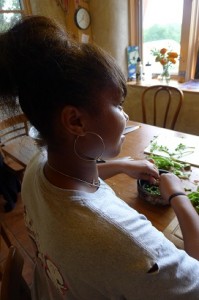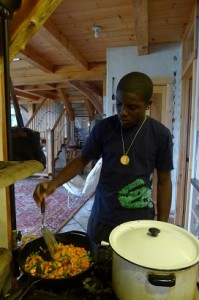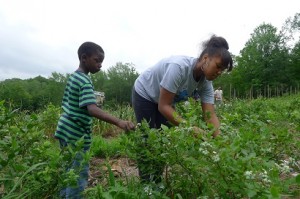- sugar snap peas (1 pound) – Eat the whole thing!
- shell peas (1 pound) – Do not eat the shells. Remove peas from pod and eat raw, or lightly steam, or blanche.
- collard greens or lacinato kale (1 bunch)
- carrots (1 bunch)
- brasing greens (1 bunch)
- lettuce (2-3 heads)
- salad mix (3/4 pound) – wash thoroughly
- sweet basil, lemon basil, thai basil or dill (1 bunch)
- radicchio (1-2 heads) – This is a trial run for this bitter green. Often eaten raw in salads, occasionally grilled. Let us know what you think. There is more about using this and the importance of having bitters in our diet in the Farm News below.
- dozen eggs or sprout mix (brown lentil, mung bean, french lentil, zesty mustard mix)
Announcements
- Please RETURN YOUR BOXES, JARS, BAGS and clean egg cartons. You can leave them where you get your share and we will retrieve them each week. Try not to rip the boxes when breaking them down. Better to keep them assembled.
- WASHING YOUR VEGGIES. We do not extensively wash veggies before delivering them to you. We will do some washing if there is a lot of dirt on greens and we always wash root crops. In general, this allows the food to stay fresher longer. It also means you need to wash your veggies before consuming them. For greens: fill a bowl with cold water. Soak greens in water for a minute. Drain water and repeat two more times. Dirt will rinse to the bottom. Bugs should float to the top.
- WE HAVE A ROAD SIGN. Look for it when you are coming to visit.
- We are looking for a delivery van. If you have any leads on something efficient, in decent shape, and affordable, please let us know!
- If you are a shareholder, you have the option of volunteering 5 hours over the course of the season in exchange for an additional week of food in the fall. Be in touch to schedule your work with us.
- Pasture raised poultry for mid summer and fall is available for pre-sale here.
- Remember that you are always welcome to visit socially and/or to volunteer. Give a call to schedule a time.
- All of our newsletters are archived on our website, along with lots more, including educational resources and recipes.
- Like us on Facebook. There are larger picture albums there, and more being added each week.
Food Justice News

Food Justice work is happening all over the world, this country, and our region. The scope and importance of this work is vast, so in addition to offering readings about the big picture of food justice work, I am exctied to share what is happening locally. Check out the work coming out of the Kitchen Santuary program at the Santuary for Independent Media here. If you have never had a chance to work with Ellie Markovitz, I would not waste another moment, and get to one of these workshops or events. She has found a means to using food as a vehicle for personal and social change. I fully appreciate the Michael Pollan quote shared on the page’s website:
Cooking–of whatever kind, everyday or extreme–situates us in the world in a very special place, facing the natural world on one side and the social world on the other. The cook stands squarely between nature and culture, conducting a process of translation and negotiation. Both nature and culture are transformed by the work. And in the process, I discovered, so is the cook.
Recipe – Bean Burgers (great for those of you who don’t know what to do with your sprouts)
Ingredients
- 1/2 onion, diced
- 2 cups cooked beans (any kind, black, pinto, etc)
- 1/2 cup masarepa (corn flour for making tortillas – from Hispanic market)
- 2 diced garlic cloves
- 1/2 cup of any shredded vegetables (sprouts, carrots, greens, etc.)
- salt and pepper to taste
- spices (optional)
- oil for frying or baking
Sautee the onions and veggies till soft, about 3-5 minutes.In a large bowl, mash the beans until almost smooth. Add sauteed onions and the rest of the ingredients, except the oil, adding the masa a few tablespoons at a time to combine well. Mixture will be thick. Form bean mixture into patties, approximately ½ inch thick and fry patties in a small amount of oil until slightly firm. You can also bake them in the oven on a baking tray at 350 to reduce the amount of frying. Enjoy!
Farm News
So many hands on the farm last week and the return of the sun means the farm is vibrating with growth. Or maybe we are still reeling from the party. Either way, it is beautiful and green and delicious. A perfect backdrop to welcome our first group of youth visitors this Monday. The Arbor Hill Community Center summer youth program joined us for a day of farm work, harvesting, and cooking lunch together. You know it’s good when there is no salad left over. This is the group that will be conducting the food security surveys in Arbor Hill. Following lunch, the adults paired off with young people as mock interviewees. We shared knowledge to better understand food justice terminology, and practice giving the interview. Thank you shareholder, Amanda aeglow, for your dedicated work in the Arbor Hill Community and for being such a powerful positive presence in the lives of these young people.
July on the farm means many early crops, such as peas, lettuce and greens are finishing up, and we are starting many second plantings for many fall crops. Only four weeks in the CSA distribution and fall is in sight. Wow! Time flies. This process for us is one of constantly feeding our soil. Every time we take something out of a bed, we take the opportunity to return enough back to the soil to leave it better off than when we starting. This means each planting area gets a top dressing of compost. And new to the mix this year, we are adding micro nutrients and other amendments to the compost to encourage vibrant biological soil activity.
Also of note, we said a temporary goodbye to Sade, our intern from Maryland. Sade returns home for a week and half to join her mother and family in welcoming a new baby brother into the family. We send abundant blessings for a healthy child and mother. This child is being born into a beautiful family. Saying goodbye to Sade was far from teary. Emet led the pack of us, bombarding Sade with a spontaneous group hug and volcanic love. Living, working, playing together here, we become very close and intertwined in each others’ lives that is hard to contain.
The massive amount of peas you are receiving this week will be your last installment of peas. This cool, wet spring has been fantastic for growing peas; our best season in Soul Fire’s short history. The shell peas are great for cooking with or preserving. Do not eat the shells. Remove the peas from the pod and eat them raw or lightly steamed, or blanched. If you want to preserve them in the freezer, lightly blanch until they turn bright green (2-3 minutes), cool, and freeze. Trust me, they taste ever better when you pull them out at Thanksgiving.
Also in your share this week you will find two items of note. First, is basil. This is the first sign that summer is really here. The first of hot crops. Shortly following will be beans, and down the road, cukes, tomatoes, bell and hot peppers, and more. If you received thai (purple leaves) or lemon basil (distinct lemon smell) please let us know if you find a recipe you like that we can share with everyone.
Other harvest of note that we are including this week to recieve your constructive feedback about is radicchio. Consider this a trial. We have never grown it before, and are this year to further diversify our farm. Radicchio is a bitter green often eaten raw in salads. I have enbjoyrf it coated in olive oil, balsamic vinegar, italian spices, and quickly grilled. Thanks Amy Halloran. Many people include bitters in their diets regularly. This is a potent example of food as medicine. This is from Rebecca Hein, owner of Underground Alchemy in Albany, talking about bitter herbs:
In many cultures around the world, bitter infused drinks are served before meals. This tradition developed as a means to improve digestion and stimulate metabolism. When bitters are taken 10-15 minutes before meals the taste stimulates our bodies to prepare for the food we are about to ingest by secreting hydrochloric acid bile and the many enzymes which aid us to fully digest and assimilate all the nutrients our meal has to offer. When we are lacking in the necessary digestive secretions a range of issues may occur from indigestion to acid reflux to constipation. While strengthening the digestive system, bitters are especially beneficial to the liver. By working on the liver, bitters can improve chronic skin, hormonal, joint and inflammatory issues, as well as diminished food sensitivities. Also call on bitters to ease sugar cravings.
Let us also know how that goes.

